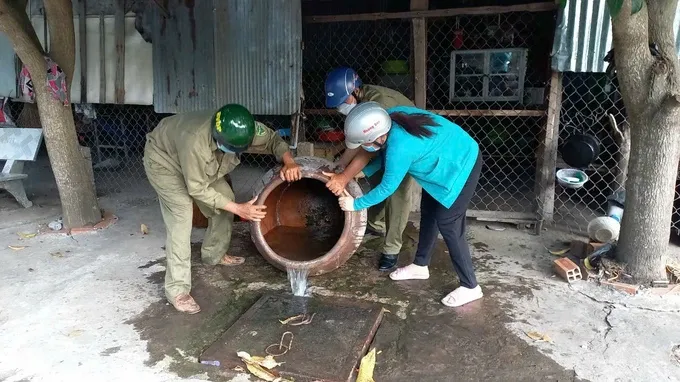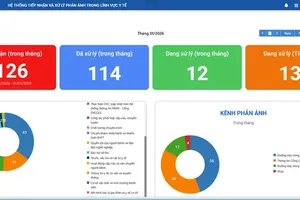The Center for Disease Control of Ben Tre Province reported that from the beginning of 2025 until now, the locality has recorded 376 cases of dengue fever, an increase of 4.3 times compared to the same period in 2024, when there were 88 cases, including eight severe cases.
Meanwhile, Long An Province has recorded 903 cases of dengue fever over the past four months, an increase of 2.1 times compared to the same period last year.
Although a risk of rapidly escalating dengue fever cases, both residents and authorities remain lacking preventive measures.

In Duc Hoa District of Long An Province, along the KT11 canal and Provincial Road 8233 connecting Duc Hoa 3 and Thai Hoa industrial parks, waste is scattered everywhere. Many plastic containers and ceramic jars are filled with stagnant water, providing breeding sites for mosquito larvae and disease vectors.
Similarly, along the banks of the Can Tho River near Xuan Khanh Market in Ninh Kieu District, Can Tho City, broken flowerpots and discarded plastic containers are home for mosquitoes to lay eggs.
Meanwhile, hand, foot and mouth disease is also developing sharply.
According to Doctor Chung Tan Dinh, Level II Specialist and Director of Soc Trang Obstetrics and Pediatrics Specialty Hospital, the number of children hospitalized with the disease is on the rise. In April alone, the hospital received 12 cases.
Similarly, since early April 2025, Can Tho Children's Hospital has been receiving 30 to 40 inpatient cases per day.
Doctor Le Nguyen Viet An, Level I Specialist in charge of the Department of Infectious Disease Prevention at the Soc Trang Center for Disease Control said that the province’s health sector has taken early action by training local medical staff to handle potential outbreaks effectively; propagandizing against the disease with widespread distribution of flyers, mobile loudspeakers and organizing regular environmental sanitation campaigns in residential areas.
The acts aim to raise public awareness for proactive disease prevention among residents as well as strengthen the response to the disease outbreaks.
Director of the Ca Mau Provincial Center for Disease Control Tran Kien Hoa informed that the province has fully supplied disinfectant chemicals for localities to carry out sterilization and disinfection whenever an outbreak is detected; strengthened surveillance of the potential disease situation across the province to ensure early detection and timely response.
Additionally, the province has inspected and monitored disease prevention at hotspots and areas with a high risk of outbreaks, coordinated with local authorities to carry out environmental sanitation campaigns and mosquito larva elimination initiatives.
The People’s Committee of Can Tho City has recently instructed the municipal Department of Health to coordinate with relevant units to implement specific plans, proactively respond to potential disease outbreaks during the summer.
The goal is to prevent new outbreaks, especially infectious diseases with high case numbers and mortality rates such as rabies, dengue fever, and hand, foot and mouth disease and measles.
Chairpersons of district and ward-level People's Committees are fully responsible for disease prevention and control.
























